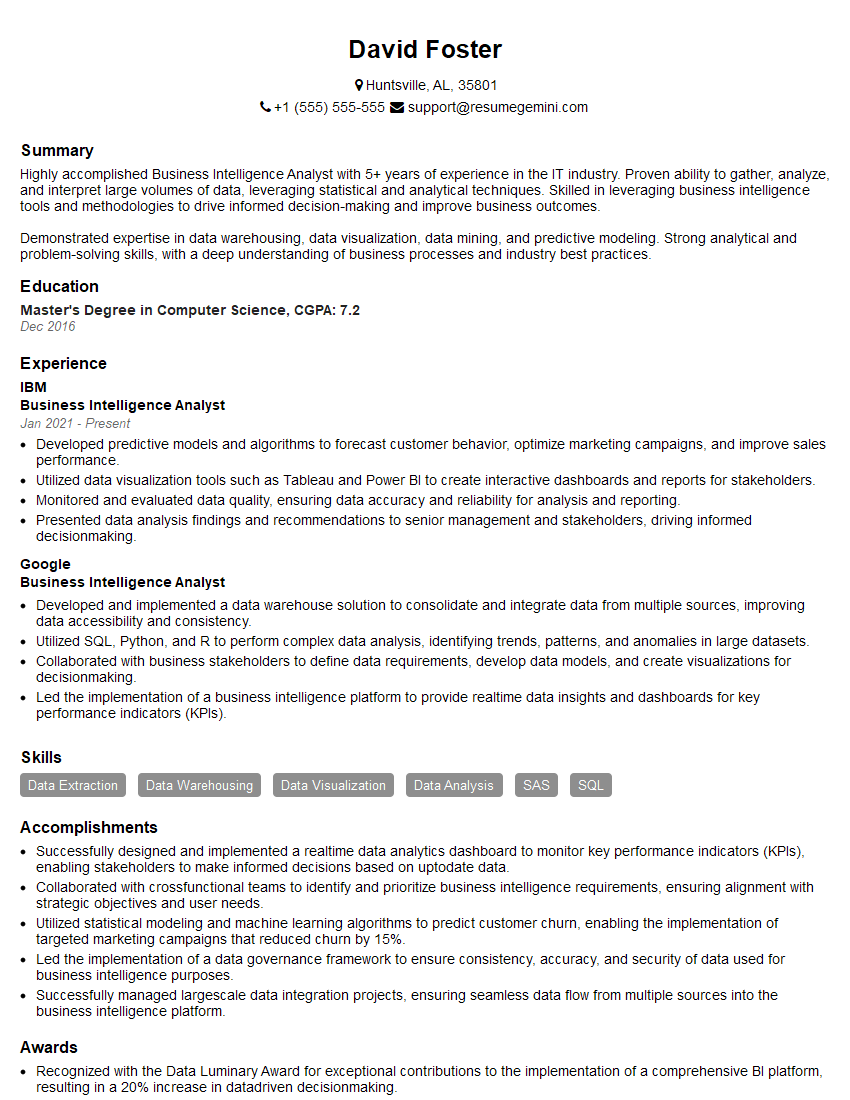Are you a seasoned Business Intelligence Analyst seeking a new career path? Discover our professionally built Business Intelligence Analyst Resume Template. This time-saving tool provides a solid foundation for your job search. Simply click “Edit Resume” to customize it with your unique experiences and achievements. Customize fonts and colors to match your personal style and increase your chances of landing your dream job. Explore more Resume Templates for additional options.

David Foster
Business Intelligence Analyst
Summary
Highly accomplished Business Intelligence Analyst with 5+ years of experience in the IT industry. Proven ability to gather, analyze, and interpret large volumes of data, leveraging statistical and analytical techniques. Skilled in leveraging business intelligence tools and methodologies to drive informed decision-making and improve business outcomes.
Demonstrated expertise in data warehousing, data visualization, data mining, and predictive modeling. Strong analytical and problem-solving skills, with a deep understanding of business processes and industry best practices.
Education
Master’s Degree in Computer Science
December 2016
Skills
- Data Extraction
- Data Warehousing
- Data Visualization
- Data Analysis
- SAS
- SQL
Work Experience
Business Intelligence Analyst
- Developed predictive models and algorithms to forecast customer behavior, optimize marketing campaigns, and improve sales performance.
- Utilized data visualization tools such as Tableau and Power BI to create interactive dashboards and reports for stakeholders.
- Monitored and evaluated data quality, ensuring data accuracy and reliability for analysis and reporting.
- Presented data analysis findings and recommendations to senior management and stakeholders, driving informed decisionmaking.
Business Intelligence Analyst
- Developed and implemented a data warehouse solution to consolidate and integrate data from multiple sources, improving data accessibility and consistency.
- Utilized SQL, Python, and R to perform complex data analysis, identifying trends, patterns, and anomalies in large datasets.
- Collaborated with business stakeholders to define data requirements, develop data models, and create visualizations for decisionmaking.
- Led the implementation of a business intelligence platform to provide realtime data insights and dashboards for key performance indicators (KPIs).
Accomplishments
- Successfully designed and implemented a realtime data analytics dashboard to monitor key performance indicators (KPIs), enabling stakeholders to make informed decisions based on uptodate data.
- Collaborated with crossfunctional teams to identify and prioritize business intelligence requirements, ensuring alignment with strategic objectives and user needs.
- Utilized statistical modeling and machine learning algorithms to predict customer churn, enabling the implementation of targeted marketing campaigns that reduced churn by 15%.
- Led the implementation of a data governance framework to ensure consistency, accuracy, and security of data used for business intelligence purposes.
- Successfully managed largescale data integration projects, ensuring seamless data flow from multiple sources into the business intelligence platform.
Awards
- Recognized with the Data Luminary Award for exceptional contributions to the implementation of a comprehensive BI platform, resulting in a 20% increase in datadriven decisionmaking.
- Received the Business Intelligence Excellence Award for developing and delivering a customized data visualization tool that enhanced the accessibility and usability of complex data sets.
- Consistently ranked among the top 5% of Business Intelligence Analysts in the organization for innovative data analysis techniques and exceptional customer service.
- Awarded the Data Analytics Superstar recognition for developing a predictive analytics model that improved revenue forecasting accuracy by 18%.
Certificates
- Certified Analytics Professional (CAP)
- Tableau Certified Associate
- Microsoft Certified: Azure Data Fundamentals
- AWS Certified Solutions Architect – Associate
Career Expert Tips:
- Select the ideal resume template to showcase your professional experience effectively.
- Master the art of resume writing to highlight your unique qualifications and achievements.
- Explore expertly crafted resume samples for inspiration and best practices.
- Build your best resume for free this new year with ResumeGemini. Enjoy exclusive discounts on ATS optimized resume templates.
How To Write Resume For Business Intelligence Analyst
- Highlight your relevant skills and experience in your resume.
- Showcase your ability to interpret and communicate data insights effectively.
- Use specific examples to demonstrate your impact on business decision-making.
- Obtain industry certifications to enhance your credibility.
Essential Experience Highlights for a Strong Business Intelligence Analyst Resume
- Identify business intelligence requirements and develop data models.
- Design and implement data warehouses and data marts.
- Utilize data visualization tools to create dashboards and reports.
- Perform data analysis using statistical and analytical techniques.
- Develop and implement predictive models to forecast trends and identify opportunities.
- Collaborate with business stakeholders to ensure data-driven decision-making.
- Monitor and manage data quality and data governance initiatives.
Frequently Asked Questions (FAQ’s) For Business Intelligence Analyst
What are the key skills required for a Business Intelligence Analyst?
Key skills include data analysis, data visualization, data warehousing, predictive modeling, and business intelligence tools.
What industries are Business Intelligence Analysts in high demand?
Business Intelligence Analysts are in high demand in industries such as finance, healthcare, retail, and manufacturing.
What are the career advancement opportunities for Business Intelligence Analysts?
Career advancement opportunities include Senior Business Intelligence Analyst, Data Scientist, and Business Intelligence Manager.
What is the average salary for a Business Intelligence Analyst?
The average salary for a Business Intelligence Analyst varies depending on experience and industry, but typically ranges from $70,000 to $120,000.
What are the educational requirements for a Business Intelligence Analyst?
A bachelor’s or master’s degree in computer science, statistics, or a related field is typically required.
What are the key challenges faced by Business Intelligence Analysts?
Key challenges include data quality, data security, and the ability to effectively communicate data insights to stakeholders.
What are some of the latest trends in Business Intelligence?
Some of the latest trends include the use of artificial intelligence and machine learning for data analysis, and the adoption of cloud-based business intelligence solutions.